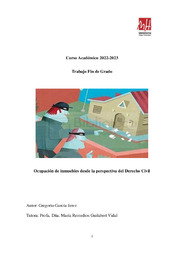Por favor, use este identificador para citar o enlazar este ítem:
https://hdl.handle.net/11000/30484Ocupación de inmuebles desde la perspectiva del Derecho Civil

Ver/Abrir:
Ocupación de inmuebles desde la perspectiva del Derecho Civil.pdf
2,25 MB
Adobe PDF
Compartir:
| Título : Ocupación de inmuebles desde la perspectiva del Derecho Civil |
| Autor : García Jerez, Gregorio |
| Tutor: GUILABERT VIDAL, MARÍA REMEDIOS |
| Editor : Universidad Miguel Hernández de Elche |
| Departamento: Departamentos de la UMH::Ciencia Jurídica |
| Fecha de publicación: 2023-09 |
| URI : https://hdl.handle.net/11000/30484 |
| Resumen : El objetivo del pres ente trabajo, es examinar, desde la perspectiva de la vía civil, haciendo una breve referencia a la parte penal, de la ocupación ilegal de viviendas, haciendo una síntesis de su naturaleza jurídica y de las acciones previstas en nuestro ordenamiento, a los efectos de poder proteger la propiedad. Este fenómeno de la “okupación” de viviendas, tiene su origen como reivindicación, de determinados colectivos sociales, a los efectos de que sus peticiones fueran escuchadas por los poderes públicos, pretendiendo t ener un acceso a la vivienda digna para aquellos sectores que carecían de ella y, en su mayoría, residían en plena calle, fenómeno conocido como el “movimiento okupa”. En base a este movimiento, apareció otro, teniendo también como base la ocupación de viv iendas sin título legítimo, pero con otras finalidades, aunque, la parte más visible y la que más daño ha hecho al derecho de propiedad, es la relativa a la ocupación de vivienda con un fin lucrativo, es decir, no por el hecho de disponer de una vivienda d onde residir, sino por el hecho de hacer de la “ocupación” un negocio, negocio que, por un lado se beneficia quien se encarga de estar al día de qué viviendas pueden ser “okupadas”, informando, a cambio de una remuneración, al que la va a ocupar , las mafia s de la “ocupación” ilegal , y, por otro lado, al auge de empresas destinadas a dar una solución a este problema, ante la tardanza de las autoridades en dar respuesta a las demandas de desocupación. Debido al aumento, especialmente en los últimos años, de este fenómeno de ocupación ilegal de viviendas, es necesario plantear, desde una perspectiva jurídica, cuáles pueden ser las soluciones legales que ofrece nuestro ordenamiento jurídico. A lo largo del presente trabajo, se analizará la ocupación, procedien do al estudio de las distintas formas que tiene el propietario para poder recuperar la posesión de la vivienda ocupada sin título habilitante. De forma principal, se abordará la solución de este problema desde un punto de vista civil, aunque, no por ello, dejando de hacer una referencia a la vía penal. The objective of the present work is to examine, from the perspective of c ivil proceedings, making a brief reference to the criminal part, of the illegal occupation of homes, making a synthesis of its legal nature and the actions provided for in our legal system, the effects of being able to protect property. This phenomenon of the "squatting" of homes, has its origin as a demand, of certain social groups, for the purpose of their requests being heard by the public powers, claiming to have access to decent housing for those sectors that lacked it. and, for the most part, they liv ed in the middle of the street, a phenomenon known as the “squatter movement”. Based on this movement, another appeared, also based on the occupation of homes without legitimate title, but with other purposes, although the most visible part and the one tha t has done the most damage to the right to property is the one related to the occupation. of housing with a lucrative purpose, that is to say, not for the fact of having a house to live in, but for the fact of turning the "occupation" into a business, a bu siness that, on the one hand, benefits those who are in charge of being up to date. day of which houses can be "squatted", informing, in exchange for remuneration, who is going to occupy it, the mafias of the illegal "occupation", and, on the other hand, t he rise of companies destined to provide a solution to this problem, given the delay of the authorities in responding to the demands for unemployment. Due to the increase, especially in recent years, of this phenomenon of illegal occupation of homes, it is necessary to consider, from a legal perspective, what may be the legal solutions offered by our legal system. Throughout the present work, the occupation will be analyzed, proceeding to the study of the different ways that the owner has to be able to reco ver possession of the occupied dwelling without a qualifying title. Mainly, the solution of this problem will be addressed from a civil point of view, although, not for this reason, ceasing to make a reference to criminal proceedings |
| Palabras clave/Materias: Ocupación vivienda Ocupa Inquilino moroso Desahucio Allanamiento Occupation of housing Occupy Defaulting tenant Eviction Breaking |
| Área de conocimiento : CDU: Ciencias sociales: Derecho: Derecho civil |
| Tipo de documento : info:eu-repo/semantics/bachelorThesis |
| Derechos de acceso: info:eu-repo/semantics/openAccess Attribution-NonCommercial-NoDerivatives 4.0 Internacional |
| Aparece en las colecciones: TFG- Derecho |
 La licencia se describe como: Atribución-NonComercial-NoDerivada 4.0 Internacional.
La licencia se describe como: Atribución-NonComercial-NoDerivada 4.0 Internacional.
.png)